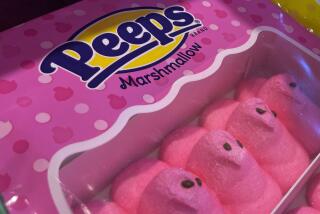FDA strikes a sour note for corn sweetener makers
There’s chutzpah and then there’s just plain wrong.
The Corn Refiners Assn., stung by accusations that high-fructose corn syrup is a leading cause of the obesity epidemic, applied to the Food and Drug Administration a couple of years ago for permission to change the name of the refiners’ product to the more pleasant-sounding “corn sugar.”
The FDA has finally issued its ruling: No.
“The use of the term ‘corn sugar’ to describe high-fructose corn syrup — a product that is a syrup — would not accurately identify or describe the basic nature of the food or its characteristics,” Tamara Ward, an agency spokeswoman, told me.
“Under FDA regulations, a sugar is a solid, dried and crystallized food, whereas syrup is an aqueous solution or liquid food,” she said. “The term ‘corn sugar’ for high-fructose corn syrup would incorrectly suggest that it is a solid, dried and crystallized sweetener obtained from corn when it’s actually a liquid sweetener solution derived from corn, following processing.”
In other words, it wouldn’t be an accurate description of the product, and would potentially mislead consumers into thinking it’s something that it’s not.
And that’s exactly what the corn syrup industry was trying to do.
Their reasoning: If people have a negative perception of high-fructose corn syrup, just call it something else.
Kind of like calling a tax increase a “revenue enhancer” or employee layoffs merely an act of “right sizing.”
The Corn Refiners Assn. tried to spin the FDA ruling as best it could. Audrae Erickson, the industry group’s president, said she and her cohorts strive “to educate consumers about high-fructose corn syrup, particularly that it is nutritionally equivalent to other sugars.”
She insisted that the FDA’s nixing of the name change was based on “narrow, technical grounds” and “did not address or question the overwhelming scientific evidence that high-fructose corn syrup is a form of sugar and is nutritionally the same as other sugars.”
Erickson is right. Nutritionally speaking, there’s virtually no difference between high-fructose corn syrup cooked up in a factory and the sucrose made from sugar cane or sugar beets, said Dr. Robert Lustig, a pediatric endocrinologist and obesity expert at UC San Francisco.
But that nutritional equivalence is not why some believe high-fructose corn syrup is evil.
“The reason high-fructose corn syrup is evil is because it’s cheaper than sucrose,” Lustig said. “Because it’s cheaper, it’s finding its way into everything. Things that never had sugar before now have it.”
Why? Because the body thinks sweet things taste better and responds with feelings of pleasure. And whenever the body feels pleasure, its first instinct is to want more of whatever produced the happy sensation.
The food industry knows this and has been pumping high-fructose corn syrup into everything from breakfast cereals to sodas. It’s not that high-fructose corn syrup is worse for you than other sugars. Rather, it’s that people consume a lot more of it.
“Any product that promotes reward will drive excessive consumption,” Lustig said. “The cheaper it is and the more we want it, the deeper into trouble we get.”
And we’re in trouble deep.
About 42% of the U.S. population will be obese by 2030, according to a recent forecast in the American Journal of Preventive Medicine. That means an additional 30 million Americans will count themselves among the supersized within 18 years.
Meanwhile, about a third of U.S. kids are already either overweight or obese, according to the U.S. Centers for Disease Control and Prevention.
Such runaway gluttony is resulting in higher rates of diabetes, heart disease, strokes, cancer and other serious ailments, which will translate to a near doubling of those annual medical expenses to $550 billion by 2030, researchers estimate.
New York is trying to take a stand. The city’s mayor, Michael Bloomberg, says he’ll seek to limit sugary soft drinks sold at restaurants, movie theaters and sports stadiums to no more than 16 ounces per cup.
A 16-ounce Coke contains nearly 200 calories, or about 10% of your entire recommended daily intake.
Beverage companies say the New York plan is nanny-state regulation run amok — and to some degree they’re right. The problem is that leaving people to their own devices is turning us into a nation of porkers. Bloomberg has concluded that to protect the public welfare, we have to save us from ourselves.
Has high-fructose corn syrup gotten a bad rap? Yes, insofar as many people consider it to be nutritionally worse for you than other sugars. The truth is that you’ll get just as pudgy drinking a corn-syrup-drenched Pepsi as you will eating a sugary piece of cake.
It’s all a matter of moderation. For its part, the sugar industry deserves its own spanking for pitching its sweet powder as the “all natural” alternative to processed corn syrup. It might be all natural, but it’s not any better for you.
Amid such jockeying for consumers’ favor, the Corn Refiners Assn. was trying to pull a fast one by seeking a friendlier name for its product. The FDA ruled correctly by rejecting the name change.
Now maybe it should go a step further and switch the name of all sugars to “fat makers.”
Truth in advertising.
David Lazarus’ column runs Tuesdays and Fridays. He also can be seen daily on KTLA-TV Channel 5. Send your tips or feedback to david.lazarus@latimes.com.
More to Read
Inside the business of entertainment
The Wide Shot brings you news, analysis and insights on everything from streaming wars to production — and what it all means for the future.
You may occasionally receive promotional content from the Los Angeles Times.











